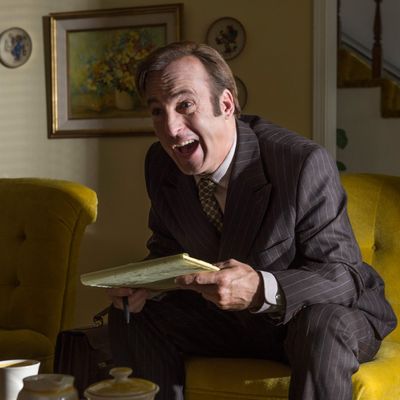
On a recent drive, I had the opportunity to hear, not once but twice, a radio review of Battle Creek, a cop show whose pilot was written by Vince Gilligan about 12 years ago and shelved by CBS until now. The reviewer praised the show for how cleverly it deviated from the expectations we have of network cop dramas, which are still dominated by badass fluff like CSI: Miami, where our heroes tear through their cases in simple, hour-long arcs, preferably in sunglasses.
As a creator, Gilligan has had an enormously successful career, and not just starting with Breaking Bad — anyone who was writing and producing something like The X-Files before the age of 30 is doing well. But Gilligan’s arc is also the arc of television, of how we watch it and what we expect of it. Part of the reason CBS resuscitated Battle Creek was in an effort to cater to the feverish, binge-watching fans of shows like Breaking Bad, which aren’t just hour-long breaks from life but alternate realities available to explore for days at a time — creating a type of viewer who didn’t exist 20 years ago, in part because the medium didn’t support it. Put another way: Battle Creek is being pitched as network TV that approaches the complexity of cable.
I bring all this up to stress the importance of context: Compared the best television has to offer, Better Call Saul seems like a pretty good, sturdy show; compared to the rest of television, it’s superheroic. Maybe I went into this week’s episode with my faith in the show redoubled, or maybe it really was just That Good, but by the time the credits rolled, I was in love.
A show predetermined by its outcome — in the sense that we know where Saul ends up — necessarily struggles against expectations: Instead of drawing the clearest line between point A and point B, it has to make that line as circuitous, unpredictable, and zigzaggy as possible. The uncredited co-star of “Alpine Shepherd Boy” is chance. Did anyone expect Chuck’s elderly neighbor to call the police on Chuck for stealing the paper, for example? Or for the police to see into Chuck’s basement window and think, meth? Or that Jimmy would start the episode never having heard of “elder law” but end up handing out Jell-O cups with his face printed on the bottom to the break room of some Albuquerquean old-folks home? And all because an elderly woman working out the legal futures of her Hummel figurine collection had enough cash on hand to pay Jimmy’s day rate?
(An aside: What a pleasure to see Jimmy among the old folks, working them with his bready, Midwestern charm. As someone who was a little skeptical of Bob Odenkirk’s range, it’s been amazing to watch the show not just write around his limitations but directly into his natural presence: a little hokey, a little sleazy, a little sweet, a little gruff — the cornball, reluctant; the salesman who has sold the sizzle so long that he’s fallen in love with the sound of it. Watching him glide across the room of radiant old people reminded me of Denis Johnson’s Jesus’ Son or even Altman’s 3 Women, narratives in which scenarios of assisted living in the desert are played so straight that they become surreal, a reminder that banality tends to offer better material than anything else.)
Each step in “Alpine Boy” felt fresh, funny, and natural, less like narrative gear-turning than the loose serendipity of life. Watching Jimmy explain his plan to Chuck made me happy because it wasn’t a plan at all, just another freestyle that he spouts off in a pinch and has to live up to later, like telling a friend you’re going to exercise more just to feel like someone’s watching in case you don’t. We’re in the realm of the left turn now.
Consequently, it makes sense that the episode was so digressive: We’ll probably never see the talking porno toilet again, or the fanatical secessionist with his taxidermy palace and raft of cash printed with his own face on it — they’re color in an increasingly colorful world, one that can exist no matter where the story goes.
It’s also probably why we end not with Jimmy, but with a detour into the quietly unfolding world of Mike Ehrmantrout, up all night in the parking booth, a place that — like Jimmy’s nail salon — has become one of the show’s most wonderful locations, a sad little out-of-the-way place that we temporarily call home. Someone should give Jonathan Banks a bag of gold for what he does with his eyebrows, or perhaps his eyebrows could have their own Better Call Saul spinoff: Raise You One, maybe, or Hairy Secrets. Chuck drama aside, “Alpine” was an episode that felt, well, fun, in the most nourishing sense of the word: a state in which you don’t know exactly what’s going to happen and, for a few stray minutes here and there, no longer care.

